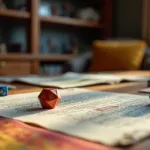
4 Best story-driven RPG games on Playstation
Known for their captivating narratives and unforgettable characters, these 4 best story-driven RPG games on PlayStation redefine immersive gameplay experiences.
Creating an RPG game as a beginner involves far more than learning how to code—it begins with clear planning, structured design, and understanding the fundamental elements that make role-playing games immersive. RPGs are one of the most complex game genres, blending story, exploration, character building, and strategic combat.

That’s why beginners must break the process into manageable stages. Choosing beginner-friendly tools like RPG Maker, Godot, or Unity can help you create an RPG game as a beginner without becoming overwhelmed. The journey from idea to playable prototype is also iterative: you’ll build, test, and refine repeatedly.
With smart planning, realistic goals, and consistent improvement, you can create an RPG game as a beginner that feels polished, cohesive, and engaging.
Planning your RPG story and characters is the first step in building a compelling game. Even if your RPG uses simple mechanics, players will connect more deeply when the world feels meaningful. Start by outlining the central conflict: what threatens your world, and what must the hero achieve? A strong RPG story begins with this foundation—clear stakes, defined goals, and believable motivations.
Your characters should feel grounded, even if your world is full of magic, monsters, or futuristic technology. Give your hero a brief but meaningful backstory. What shaped them? What do they want? Who do they fear or admire? Even secondary characters benefit from simple motivations, as these help guide meaningful conversations, quests, and emotional moments.
To keep your RPG story engaging, add twists that surprise players without confusing them. A mystery that slowly unfolds, a betrayal from a trusted ally, or a hidden truth about the world can keep the narrative exciting. Make sure your characters’ choices and motivations align naturally with the main plot. When your characters influence the narrative, players feel more connected to the journey.
With careful planning, your RPG story and characters work together to build a world that players want to explore. This story foundation will guide your design choices, from level progression to enemy encounters, ensuring consistency throughout your project.
While story and characters provide emotional depth, the feel of the RPG comes from the core RPG mechanics that define gameplay. These mechanics shape how players interact with your world and make decisions during battles, exploration, and progression.
Turn-based combat is one of the most popular core RPG mechanics. It allows players to plan their moves, manage items, and think strategically instead of relying solely on reflexes. As a beginner, start simple: basic attacks, abilities with cooldowns, and items that heal or boost stats. You can expand later with elemental systems, status effects, or combo mechanics.
Character progression is another central pillar of RPG design. Players expect their hero to grow stronger, unlock skills, and evolve over time. Simple systems like leveling, talent trees, or upgradeable equipment work well for beginners. The key is making progression feel rewarding without overwhelming the player.
When combined thoughtfully, these core RPG mechanics create depth and replayability. They also help beginners understand how small systems support larger player experiences. Even a simple RPG becomes memorable when combat is fun, progression feels meaningful, and mechanics connect naturally with the story.
Selecting the right game development software is a crucial decision for any aspiring RPG creator. The best tool depends on your experience, preferred workflow, and project scope. Start by comparing engines based on documentation, tutorials, and built-in systems that support RPG mechanics.
RPG Maker is one of the easiest choices for beginners. It includes built-in systems for maps, events, dialogue, and turn-based combat. You can focus more on story and design without needing to code. It’s perfect for classic 2D JRPG-style games.
Godot is a free, open-source engine with a gentle learning curve. It supports both 2D and 3D development, has strong documentation, and makes scripting simpler through its language GDScript. Many indie RPGs use Godot for its flexibility and performance.
Unity offers the most power among the beginner-friendly options, though it requires more learning. With its huge asset store, community tutorials, and flexibility, you can create anything from action RPGs to large open worlds. Beginners can start with templates or pre-built frameworks to reduce complexity.
Before committing to an engine, check its platform support. The best game development software exports to PC, mobile, and consoles, helping you reach more players with fewer compatibility issues. Choosing the right engine sets the tone for your entire project, making development smoother and more enjoyable.
Designing your game world and levels determines how players experience your story and gameplay. World building helps make your RPG feel alive, while level design shapes pacing, challenge, and exploration.
Start with a simple world map. Divide your world into regions with different themes: forests, caves, towns, deserts, or futuristic districts. Each area should have a unique atmosphere, enemies, and purpose. Even small visual or mechanical differences can make regions memorable.
Level design involves structuring pathways, goals, and rewards. Make sure players understand where to go without feeling restricted. Use landmarks, lighting, NPC hints, or subtle environmental clues to guide exploration. A good level should balance open spaces with focused paths, allowing players to explore without getting lost.
Keep objectives consistent with the story: rescue missions, dungeon crawls, puzzles, or boss fights. Add meaningful rewards like new weapons, lore, or shortcuts. When designing your game world and levels with intention, players feel immersed and motivated to keep progressing.
Once your world and levels are planned, it’s time to bring them to life by programming basic gameplay features. These features form the skeleton of your RPG and determine how players interact moment-to-moment.
Start with movement and interaction. Ensure your character can walk, run, and interact with objects or NPCs. Add visual feedback like animations, sounds, or on-screen prompts to make actions feel responsive.
Next, program key systems like combat and inventory. Combat mechanics define how players fight enemies, while inventory systems track items, equipment, and consumables. Begin with simple functionality and expand later. Creating stable foundational systems is more important than adding complexity too early.
Programming basic gameplay features also includes UI design: menus, health bars, experience counters, and dialogue boxes. Clean UI helps players understand game information quickly, improving usability and immersion.
By gradually programming basic gameplay features and testing each one as you go, you build a solid framework that supports deeper systems later.
Testing is one of the most important steps in building an RPG. Even the best ideas can fail without proper tuning. Begin with small playtests, ideally involving different types of players—newcomers, RPG fans, and experienced gamers.
Create a feedback system to track bugs, difficulty issues, unclear mechanics, or pacing problems. Ask testers questions like:
Use an iterative process: test, adjust, test again. Improve combat balance, refine dialogue, shorten confusing sections, and expand areas that players enjoy. Over time, your RPG becomes more polished, engaging, and fun.
Creating an RPG game as a beginner starts with clear planning and small, achievable goals. Build a simple but meaningful story, craft relatable characters, and understand core RPG mechanics like combat and progression. Choose beginner-friendly software that fits your project scope and skill level. Design a small, immersive game world, implement foundational gameplay features, and test often to refine your systems.
With patience and consistent improvement, creating an RPG game as a beginner becomes a realistic path—not just a dream. Step by step, you’ll turn your initial idea into a playable, polished RPG experience.

Known for their captivating narratives and unforgettable characters, these 4 best story-driven RPG games on PlayStation redefine immersive gameplay experiences.

Optimizing your RPG character build requires mastering class choices and skill synergy, but the ultimate strategy goes beyond simple stats—discover what truly matters.

Intrigued by RPGs but unsure where to begin? Discover key factors that will shape your adventure and ensure your first game captivates you.

Crack the secret to rapid RPG leveling by choosing the right class and quests—discover strategies that keep your progress unstoppable.

Step into the world of RPGs where action meets strategy, but which style truly defines your perfect gaming adventure? Discover the key differences inside.

The time to beat Baldur's Gate 3 varies greatly, depending on your choices and playstyle—discover what influences the journey ahead.